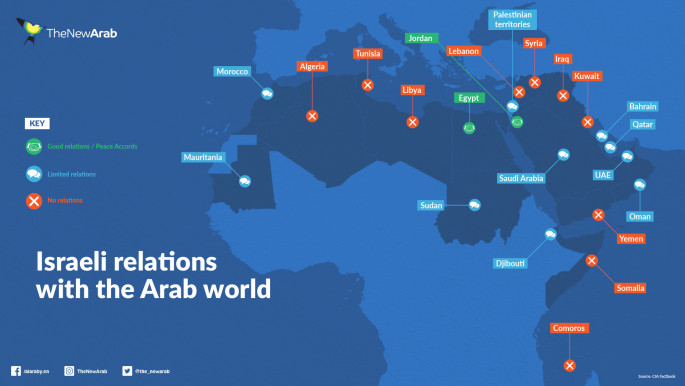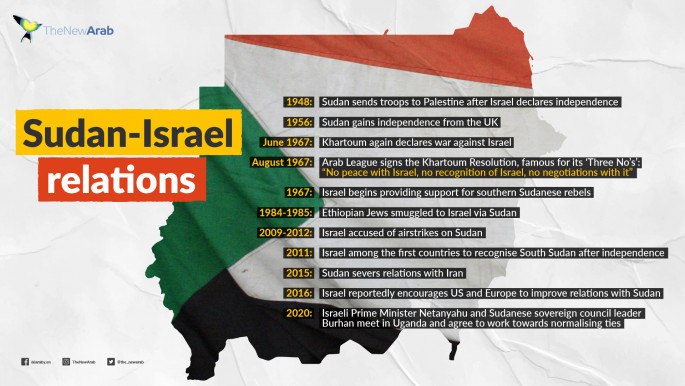Bibi, Burhan, best friends? How Sudan generals' rapprochement with Israel exposes weakness of democratic transition
For Netanyahu, the benefits of this meeting are clear. In the run up to the March 2 elections – the third the premier has had to contest in 12 months – he is able to bolster his diplomatic credentials and provide his right-wing base with the prospect of deporting Sudanese migrants from Israel.
But the groundbreaking meeting, highly controversial in the Arab world where a majority is opposed to 'normalising ties' with Israel, has revealed cracks in the foundation of Sudan's transitional government.
Burhan, the leader of Sudan's Sovereign Transitional Council, flew to Entebbe in absence of a prior announcement and without the knowledge of Sudan's council of ministers – including its foreign minister.
At the same time, Prime Minister Abdalla Hamdok was in Djibouti for a regional trade meeting.
It was not until nearly two days later that the civilian face of Sudan's much-touted transition to democracy acknowledged the decision which will surely be controversial among the Sudanese public as well. To make matters worse, it's not yet clear whether the prime minister had any clue the meeting was set to take place.
In a meandering statement on Wednesday morning, Hamdok stated that the transitional government "must ensure accountability, responsibility and transparency" in all decisions in order to ensure a "truly democratic state".
"The constitutional declaration... states that decisions related to Sudan's foreign affairs must be made by the Council of Ministers," he said.
 |
| [Click to enlarge] |
Hamdok has previously stated relations between the military and civilian factions of the transitional government are "harmonious". The alleged complicity of senior military officials in attacks on demonstrators has already tempered such claims, and many Sudanese are questioning who is really pulling the shots in the wake of Burhan's meeting with Netanyahu.
While the Sudanese prime minister ultimately "welcomed" the surprise meeting, his statement all but acknowledged that the decision came without his knowledge.
Meanwhile, US Secretary of State Mike Pompeo appears to have known about the meeting long before the Sudanese council of ministers.
In a Sunday phone call with Burhan the secretary of state thanked the general for "his leadership in normalising ties with Israel", according to a statement by State Department Spokesperson Morgan Ortagus.
It's no mistake that Washington has reacted to the move before any Sudanese official.
Khartoum seeks an out from terrorism sponsor designation
Reports indicate the Ugandan meeting comes amid backdoor negotiations to see Khartoum removed from the US State Sponsors of Terrorism list (SST).
Sudan's presence on the list – which dates back to the '90s when the Bashir regime was harbouring Al-Qaeda leader Osama bin Laden – means it is subject to punishing sanctions and its access to foreign aid is hampered.
Hamdok has made Sudan's removal from the SST list his top priority since taking office in August. Without it the prime minister contends Sudan's debilitated economy, burdened with a foreign debt of around $60 billion, will never be able to heal. The country continues to deal with the punishing economic circumstances – inflation of about 60 percent, soaring unemployment and chronic shortages of fuel and foreign currency – that pushed many to protest against Bashir in December 2018.
Although the prime minister announced in December that Sudan has just one more requirement to fulfil before being removed from the list – a hefty payment of more than $2 billion in compensation for Al-Qaeda attacks – the process of removal is lengthy and opaque. Reports indicate Washington may seek further assurances beyond financial compensation.
Read more: Power and politics: Israel makes new inroads into Africa
In talks ahead of Tuesday's meeting, Sudanese officials requested Israel "help open doors in Washington and encourage the Trump administration to change Sudan's designation as a state sponsor of terror", Israeli officials told Channel 13 correspondent Barak Ravid.
|
|
Netanyahu "believes Sudan is headed in a new positive direction" and has relayed those views to Secretary of State Pompeo, the Israeli prime minister's office said in a statement on Tuesday. It added that Burhan was "eager to help his country modernise by taking it out of isolation".
But the Israeli premier may even have encouraged Pompeo ahead of his meeting with Burhan. Netanyahu raised the issue with the secretary of state while in Washington last week for the much-anticipated reveal of the Trump administration's Israel-Palestine peace plan, officials told Ravid.
Pompeo subsequently called Burhan and invited him to meet in Washington later this year, in what will be the highest level meeting between US and Sudanese officials since Bashir’s ousting.
"Israel has a long history of operating as an intermediary between African leaders and Washington, and has consistently sought to leverage its close relationship with the US to advance its interests in the continent," said Yotam Gidron, researcher and author of the forthcoming book Israel in Africa.
Burhan's meeting with Netanyahu was not only a product of discussions between US and Israeli officials, however.
The United Arab Emirates engineered the meeting between Burhan and Netanyahu, the Associated Press reported citing an unnamed senior Sudanese official.
 |
Emirati machinations in the Horn of Africa
Abu Dhabi reportedly encouraged Sudan's military leadership to pursue negotiations with Israel with encouragement that the efforts could "accelerate" its delisting from the SST.
The Gulf state alongside ally Saudi Arabia was the first country to grant support and legitimacy to Burhan's transitional military council back in April last year. Since then, it has been a key backer of the military, granting financial and material aid as well as diplomatic support to controversial figures such as Burhan and paramilitary chief Mohammad Hamdan Daglo.
|
|
For many, Abu Dhabi's role in Sudan is suspect and part of its much-documented attempts to furtively build alliances in both the Middle East and Africa. For now, however, it is not clear what the UAE stands to gain by backing normalisation efforts between Sudan and Israel.
Observers shouldn't be surprised by Tuesday's declaration of warming ties despite the countries' tense relationship in the past, Gidron, the researcher on Israeli relations in Africa, said.
Sudan was previously seen as a close ally of Iran, aiding the Islamic Republic by facilitating arms transfers to the besieged Gaza Strip. Israel was accused of conducting several air strikes against arms smugglers and a munitions factory in Sudan between 2009 and 2012.
But that changed five years ago when Khartoum cut ties with Tehran, a move that cemented its relationship with the UAE-Saudi regional axis.
"Israel has made a very concerted effort in the past three years to improve relations with countries in the Horn of Africa," said Cameron Hudson, senior fellow at the Atlantic Council and a former chief of staff to the office of the US Special Envoy to Sudan.
Read more: What is the UAE's game in the Horn of Africa?
Tel Aviv's attempts to strengthen ties with states across the continent come "as part of a broader effort to isolate the Palestinians and gain diplomatic support", Gidron explained.
"But the warming ties between Israel and Sudan are the consequence of greater Saudi and Emirati involvement in the Horn of Africa just as much as they are the consequence of Israel's own efforts in the region," he added.
"The Horn of Africa has increasingly been drawn into Middle Eastern rivalries in recent years, with Gulf countries competing for influence along the southern shores of the Red Sea. Israel's relationship with Sudan is influenced by these dynamics, as well as by its own evolving relationships in the Gulf."
Abu Dhabi and Riyadh "have normalised relations with Israel and are using their influence to get other countries to do the same", said Hassan Ibrahim, a Sudanese student in the UK.
While neither the UAE or Saudi Arabia have official relations with Israel both, alongside other Gulf states, have seen increasingly warming ties over the past years. Most recently, ambassadors from the UAE, Oman and Bahrain were present at the unveiling of Trump's so-called "Deal of the Century" plan.
"It deflects some of the heat from them when they formally begin normalising relations," Sudanese pro-democracy activist Mohanad Elbalal explained, reflecting a wide-spread belief on social media that Sudan is being used as a test case for regional normalisation with Israel.
"It is true that normalising relations with Israel may help get Sudan of the [SST] but I do not think that this was Burhan's motivation," Ibrahim added. "Burhan is concerned with appeasing his closest allies, who have supported him during the revolution and will continue to support him should the military find itself at crossroads with the revolutionaries again."
Sudan's 'civilian on paper' governmentFor many Sudanese, Burhan's decision to build relations with Israel points to a weakness at the heart of the country's transitional government.
While much of the Sudanese public may be angered at the thought of normalising ties with Israel – which in much of the Middle East is seen as tantamount to a betrayal of the Palestinian cause – what has truly incensed many is the apparently unilateral nature of the move.
|
|
For Hudson, this reflects a wider lack of consultation and clarity around the division of responsibilities within the new regime. "When issues like this occur, it just reinforces the fact that the people who brought about and led the revolution are now being excluded from the governing of the country," he explained.
The opaque nature of power-sharing has only been compounded by the fact a civilian legislative body promised as part of the deal between the military and protest leaders has yet to materialise.
"Western diplomats were quick to celebrate the appointment of Sudan's first ever female foreign minister. While she was flown to the UN to convince the Western community of the significance of her appointment, since then she has been almost completely sidelined when it comes to Sudan's important regional diplomacy," Elbalal said, pointing to paramilitary chief Daglo taking charge in peace talks with rebels and Burhan leading relations with regional states.
Read more: One year after Bashir's downfall, Sudan's revolutionaries sleep with one eye open
"It says what I and many have believed for a long time which is that this civilian government is a shadow government that exercises no real power," he explained.
Elbalal is not alone in thinking so. For some, figures such as Burhan represent an entrenched and resilient adaptation of the former regime.
"There is a real fear in Sudan that the civilian government is only a civilian government on paper but behind the scenes, the military still seems to be calling the shots," Ibrahim said.
Complaints of the transitional government's limitations are all too common. One of protesters' most fervent demands is justice for the nearly 300 demonstrators killed during the uprising. The ranking of military leaders like Daglo and Burhan seen as directly complicit with the violence has deeply frustrated hopes for a transparent and satisfying judicial process.
"The meeting with Netanyahu is one example of that. If this trend upholds, I can see people taking to the streets again," Ibrahim added.
Apparent admissions that the military is at the helm could "finally crumble the facade that any form of civilian settlement exists in Sudan", Elbalal added.
"That in itself is more dangerous to the regime than any anger over the betrayal of Palestinians," he said.
Mel Plant is a journalist at The New Arab.
Follow her on Twitter: @meleppo





 Follow the Middle East's top stories in English at The New Arab on Google News
Follow the Middle East's top stories in English at The New Arab on Google News


